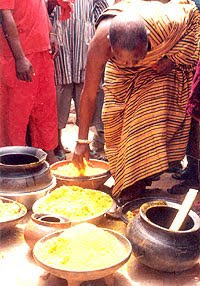
It is usually found during the months of July and August when the Homowo festival is celebrated by the various Ga communities - La, Osu, Nungua, Teshie, Ga-Mashie, Tema - or only on special occasions when sacrifices are being performed to the gods. Regardless of the occasion for which it is prepared, ‘Kpokpoi’ is an essential food to the Gas during the Homowo festival.
‘Kpokpoi’is the festal meal used in celebrating Homowo. Lore has it that the Homowo festival recounts the odyssey of the Gas from Israel through Ile Ife in Nigeria to their present location in Accra. In their journey, they were struck by severe famine, which encouraged them to embark on a massive food production exercise the following season that yielded a bumper harvest. They reveled with a festival that ridiculed hunger.
This meal which is prepared by women early on Homowo morning is made up of steamed corn flour, palm oil and is eaten with palm soup and a variety of fish from the sea. The preparation starts with the soaking of the corn in water for three days. The corn is ground and molded in a way that a little water is added which does not allow air toenter.
The ‘Kpokpoi’, which is sprinkled by Chiefs of Homowo celebrating communities along the principal streets of their communities, is cooked with the traditional pot. The pot is covered with a colander which is attached to it with corn dough and ashes. A traditional sponge is then put in the colander in order to allow the steam to gently evaporate while getting the kpokpoi steamed slowly.
The corn flour is then spread evenly in the traditional colander till it is covered almost to the brim. The corn flour will be steam-cooked in twenty to thirty minutes and then it is poured into a traditional mortar called ‘nmetso’ normally used to pound palm fruits. Here palm oil is fried with shrimps and an onion which is then mixed with the steamed corn flour in the ‘nmetso’. It is then pounded until the palm oil is uniformly mixed with the corn flour. At this point, a little okra is also boiled and ground to be mixed with a steamed corn flour with palm oil mixed corn dough.
The corn dough is then poured on a sieving material called ‘agbadza’ and sieved. During the sieving, the crumbs of the corn dough are left on the ‘agbadza’ and the fine ones which goes under either a basin or a big bowl that has been placed under the ‘agbadza’ is collected and moulded finely in plates. The rough ones left on the ‘agbadza’ are thrown away.
This meal which is sprinkled to the gods and ancestors for their guidance of inhabitants in Homowo celebrating communities, looks set for consummation after it has been sieved in the ‘agbadza’ and it is usually served with palm nut soup .
‘Kpokpoi’is the festal meal used in celebrating Homowo. Lore has it that the Homowo festival recounts the odyssey of the Gas from Israel through Ile Ife in Nigeria to their present location in Accra. In their journey, they were struck by severe famine, which encouraged them to embark on a massive food production exercise the following season that yielded a bumper harvest. They reveled with a festival that ridiculed hunger.
This meal which is prepared by women early on Homowo morning is made up of steamed corn flour, palm oil and is eaten with palm soup and a variety of fish from the sea. The preparation starts with the soaking of the corn in water for three days. The corn is ground and molded in a way that a little water is added which does not allow air toenter.
The ‘Kpokpoi’, which is sprinkled by Chiefs of Homowo celebrating communities along the principal streets of their communities, is cooked with the traditional pot. The pot is covered with a colander which is attached to it with corn dough and ashes. A traditional sponge is then put in the colander in order to allow the steam to gently evaporate while getting the kpokpoi steamed slowly.
The corn flour is then spread evenly in the traditional colander till it is covered almost to the brim. The corn flour will be steam-cooked in twenty to thirty minutes and then it is poured into a traditional mortar called ‘nmetso’ normally used to pound palm fruits. Here palm oil is fried with shrimps and an onion which is then mixed with the steamed corn flour in the ‘nmetso’. It is then pounded until the palm oil is uniformly mixed with the corn flour. At this point, a little okra is also boiled and ground to be mixed with a steamed corn flour with palm oil mixed corn dough.
The corn dough is then poured on a sieving material called ‘agbadza’ and sieved. During the sieving, the crumbs of the corn dough are left on the ‘agbadza’ and the fine ones which goes under either a basin or a big bowl that has been placed under the ‘agbadza’ is collected and moulded finely in plates. The rough ones left on the ‘agbadza’ are thrown away.
This meal which is sprinkled to the gods and ancestors for their guidance of inhabitants in Homowo celebrating communities, looks set for consummation after it has been sieved in the ‘agbadza’ and it is usually served with palm nut soup .
No comments:
Post a Comment